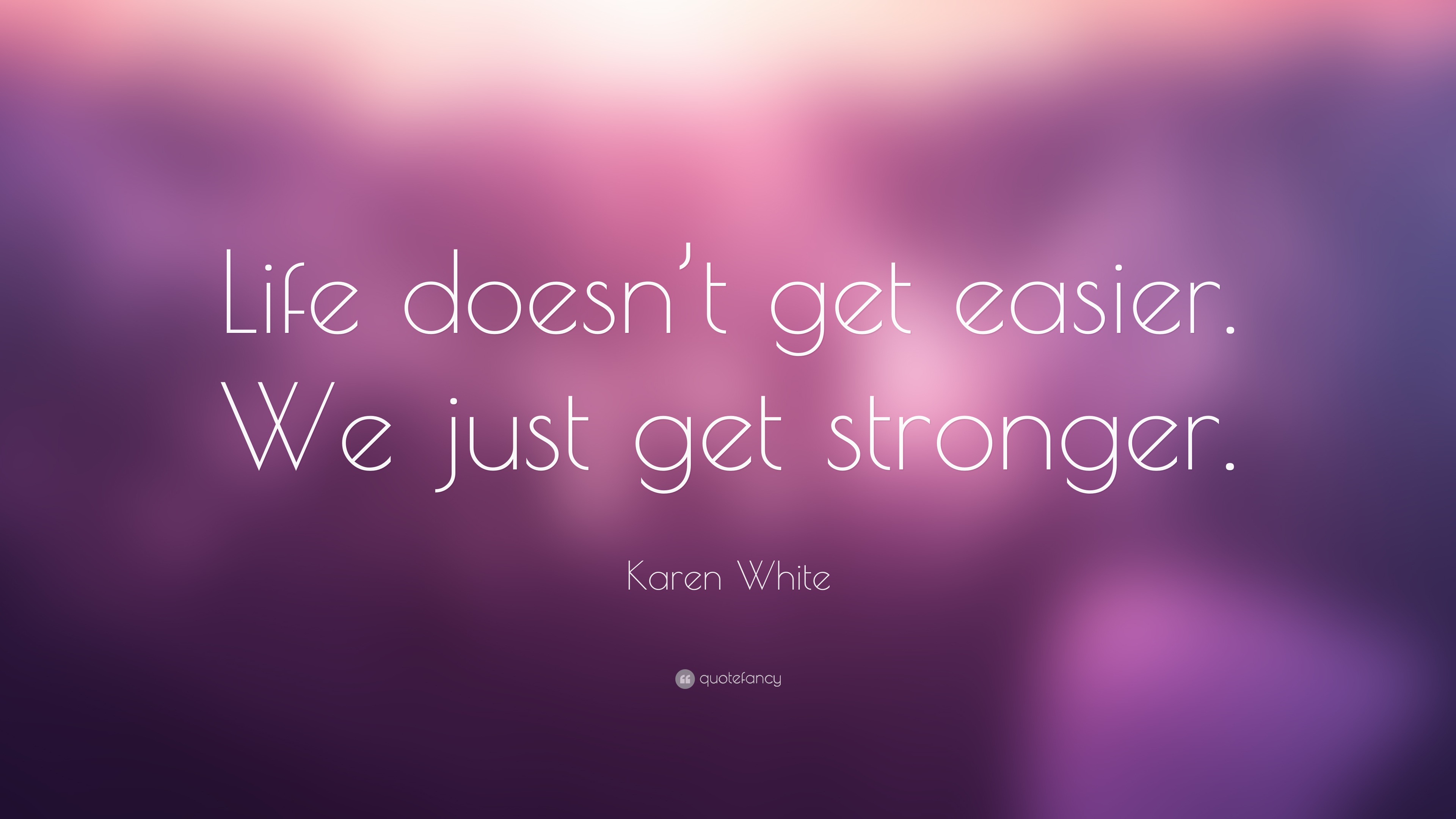Life Doesn't Get Easier, You Just Get Stronger: The Untold Journey Of Growth And Resilience
Life doesn't get easier, you just get stronger. It's a phrase that's been whispered in the corners of our minds, scribbled in journals, and shared across social media feeds. But what does it really mean? Is it just some motivational quote, or is it a deeper truth about how we navigate the ups and downs of life? Let me tell you, my friend, this is more than just words—it's a way of living, a mindset, and a reflection of the battles we fight every single day.
Think about it. Every time you stumble, every time life throws you a curveball, you have two choices: give up or rise stronger. That's where the magic happens. You see, life isn't about waiting for the storms to pass; it's about learning to dance in the rain. And trust me, I've been there—feeling lost, overwhelmed, and questioning if I'll ever find my footing again. But guess what? We all do. That's the beauty of life; it's a journey, not a destination.
So, if you're here wondering how to turn challenges into triumphs, you're in the right place. This article isn't just a collection of words; it's a roadmap to understanding the power within you. From real-life stories to actionable tips, we're diving deep into the essence of resilience. Let's explore how "life doesn't get easier, you just get stronger" becomes more than just a saying—it becomes your reality.
Read also:Matt Webster Tennessee Update The Latest Scoop On A Name Thats Got Everyone Talking
Table of Contents
- Understanding Resilience: The Backbone of Strength
- Biography of Resilience: Stories That Inspire
- How Resilience Builds Over Time
- Mental Toughness: The Key to Inner Strength
- Practical Tips to Build Resilience
- Common Misconceptions About Resilience
- A Scientific Perspective on Resilience
- Overcoming Setbacks: Real-Life Examples
- Maintaining Resilience in Everyday Life
- Final Thoughts: Embrace the Journey
Understanding Resilience: The Backbone of Strength
Resilience is like that invisible shield we carry around, protecting us from the chaos of life. But here's the thing—it's not something you're born with; it's something you develop over time. When people say, "Life doesn't get easier, you just get stronger," they're talking about resilience. It's the ability to bounce back from adversity, to keep moving forward even when the road gets tough.
Now, let's break it down. Resilience isn't just about enduring pain; it's about growing through it. Imagine every challenge as a stepping stone, each one teaching you something new about yourself. Whether it's a failed relationship, a job loss, or a health setback, resilience is what helps you pick up the pieces and rebuild.
Biography of Resilience: Stories That Inspire
Before we dive deeper, let's take a moment to celebrate the stories of those who've shown us what resilience looks like. Below is a glimpse into the lives of some incredible individuals who turned adversity into triumph.
| Name | Born | Known For | Resilience Highlight |
|---|---|---|---|
| Malala Yousafzai | July 12, 1997 | Advocacy for girls' education | Survived a Taliban attack and became the youngest Nobel laureate. |
| Nelson Mandela | July 18, 1918 | Fighting apartheid in South Africa | Spent 27 years in prison but emerged as a symbol of peace and reconciliation. |
| J.K. Rowling | July 31, 1965 | Author of the Harry Potter series | Went from being a single mother on welfare to becoming one of the most successful authors in history. |
How Resilience Builds Over Time
Building resilience isn't an overnight process. It's like working out at the gym; the more you push yourself, the stronger you become. Every setback is an opportunity to flex those mental muscles. Here's how it works:
- Emotional Awareness: Recognizing your emotions and understanding why you feel a certain way is the first step.
- Adaptability: Being open to change and willing to adjust your plans when things don't go as expected.
- Support Systems: Surrounding yourself with people who lift you up and believe in you.
- Problem-Solving: Breaking down challenges into manageable parts and tackling them one step at a time.
Mental Toughness: The Key to Inner Strength
Mental toughness is like the engine that drives resilience. It's the inner voice that tells you, "You've got this." But how do you cultivate mental toughness? Here are a few tips:
- Set realistic goals and celebrate small wins along the way.
- Practice mindfulness to stay grounded in the present moment.
- Challenge negative self-talk by reframing your thoughts in a positive light.
Remember, mental toughness isn't about being fearless; it's about facing your fears head-on and knowing you can handle whatever comes your way.
Read also:Blue Note Lounge Photos Your Ultimate Guide To Jazz Vibes And Stunning Captures
Practical Tips to Build Resilience
Now that we've covered the theory, let's get practical. Here are some actionable tips to help you build resilience:
- Develop a growth mindset by viewing challenges as opportunities to learn.
- Build a strong support network of friends, family, and mentors.
- Practice gratitude by focusing on the positives in your life, no matter how small they may seem.
- Take care of your physical health through regular exercise, a balanced diet, and adequate sleep.
These tips might sound simple, but their impact is profound. The more you incorporate them into your daily routine, the stronger you'll become.
Common Misconceptions About Resilience
There are a few myths about resilience that need to be debunked:
- Myth #1: Resilient people never feel overwhelmed. Truth: Everyone feels overwhelmed at times; resilience is about how you respond.
- Myth #2: Resilience means being tough all the time. Truth: It's okay to be vulnerable; showing emotions is a sign of strength, not weakness.
- Myth #3: Resilience is a fixed trait. Truth: Resilience can be developed and strengthened with practice.
A Scientific Perspective on Resilience
Science has a lot to say about resilience. Studies show that our brains are capable of rewiring themselves in response to challenges, a process known as neuroplasticity. This means that every time you face a difficult situation and overcome it, your brain becomes better equipped to handle future challenges.
Furthermore, research indicates that resilience is linked to factors such as genetics, environment, and life experiences. While some people may have a natural inclination toward resilience, it's a skill that can be cultivated by anyone willing to put in the effort.
Overcoming Setbacks: Real-Life Examples
Let's look at a few real-life examples of people who've overcome setbacks:
- Example #1: A single mother who lost her job but started her own business and turned it into a thriving enterprise.
- Example #2: An athlete who suffered a career-ending injury but found success as a coach and mentor.
- Example #3: A student who failed their exams but went on to graduate with honors after seeking help and changing their study habits.
These stories remind us that setbacks are not the end of the road; they're just detours on the journey to success.
Maintaining Resilience in Everyday Life
Resilience isn't just for big challenges; it's a daily practice. Here's how you can maintain resilience in your everyday life:
- Start each day with a positive affirmation to set the tone for the day.
- Take breaks when needed to recharge your mental and emotional batteries.
- Reflect on your progress regularly and acknowledge your achievements.
By making resilience a part of your daily routine, you'll find that life's challenges become easier to manage.
Final Thoughts: Embrace the Journey
Life doesn't get easier, you just get stronger. It's a mantra that reminds us of our potential to grow through adversity. As you navigate the ups and downs of life, remember that every challenge is an opportunity to become a better version of yourself.
So, take a deep breath, embrace the journey, and trust in your ability to overcome whatever comes your way. And don't forget to share this article with someone who needs to hear this message today. Together, let's build a community of resilient individuals who inspire and uplift each other.
Article Recommendations


